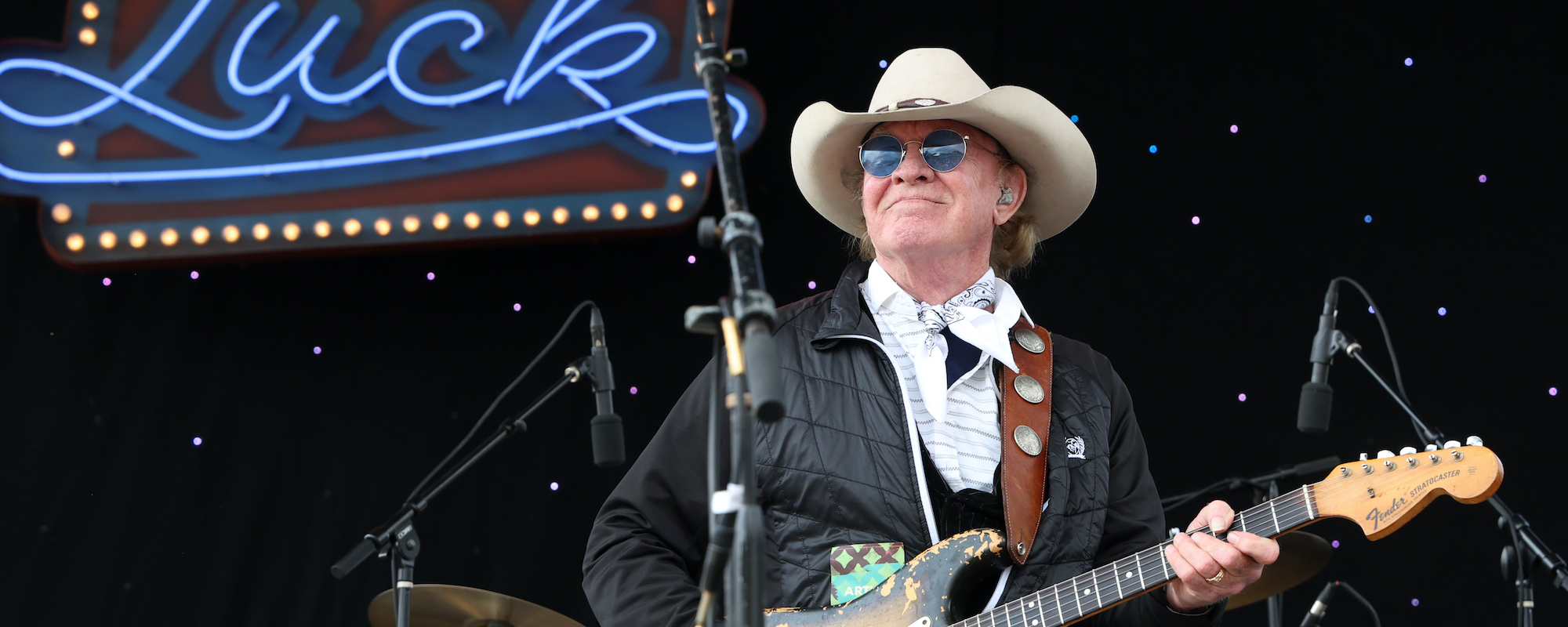Thomas Rhett has already been awake for more than four hours, and it’s only 10 a.m. on an early August Friday. His two oldest daughters—Willa Gray, 8, and Ada James, 7—are likely still asleep. But his two youngest—Lennon Love, 4, and Lillie Carolina, 2 1/2—woke up as they do every day, at 5:45 a.m.
Videos by American Songwriter
“I’ve got teenagers and babies, basically,” says the 34-year-old father of four as he eases onto the couch at American Songwriter’s Nashville offices. “But school’s about to start, so we’re trying to get back in the rhythm of getting ’em all up at that (earlier) time.”
TR and his wife Lauren are high school sweethearts who married in 2012, about one year before he released his debut album, It Goes Like This. He’s gearing up to drop his seventh studio album, About A Woman, on August 23. The project is 14 songs deep, and TR co-wrote 12 of them. The album includes his radio hit “Beautiful as You,” “Gone Country,” a semi-biographic tribute to Erich Church’s music, “Church,” an interpolation of Whitney Houston’s “I Wanna Dance With Somebody” called “Don’t Wanna Dance” and more.
Rhett conceived About a Woman as a tribute to his wife of 12 years. But the singer’s life is about women every day—Lauren and their growing family of very young ladies.
“Time is moving at such a rapid pace,” TR says, recounting a commercial that made him “cry his eyes out.”

The singer couldn’t remember what the commercial was for, but it started with an elderly man getting up early and slowly but surely lifting garden plants and putting them on a shelf. As the commercial progressed, he began to work out more and lift heavier things. When Christmas Day arrived in the commercial, the man was dressed in a suit and red tie. His two granddaughters ran down the stairs, and he picked one of them up to put the star on top of the tree.
“He had been training to pick his granddaughter up, and I freaking wept like a child,” TR says.
Like the man training to lift his granddaughters, TR had a goal tied to his little girls when recording About a Woman. He wanted to make an album his daughters want to hear—otherwise, he says, they listen to the Jonas Brothers.
Producer Dann Huff believes that About A Woman was Rhett’s reaction to the pandemic years when he became a singer-songwriter.
“He embraced his core love of country music at a high level, and he’s one of those people who is as good of an entertainer as a songwriter,” Huff says. “He has to balance those two worlds and tighten the disparity between the records. He’s an artist who isn’t any one thing. He’s servicing all those sides of his creativity.”
The tracklist started with a challenge. TR, who has had 22 No. 1 songs, knows that love ballads are his safe place. Songs including “Die a Happy Man” and “Marry Me” are tent poles in his career. However, he wants his live shows to be high-energy. When it’s time to write a set list and his biggest hits are ballads, the balance of hype and radio hits is difficult.
Huff and Julian Bunetta produced About A Woman, and Bunetta dared TR to make his ballad concepts exciting. Lauren told TR she knew he could write a love song about her but wondered if he could make her dance.
“The content is very familiar because it’s all coming from my memories with my wife, whether it was from younger years to high school to now to future thinking about my marriage and all those kinds of things,” TR shares. “I think my mission for this project was joy, smiling, and dancing. For the most part, it is mission accomplished.”
TR had more time than usual to make About A Woman. In the past, he wedged the recording process around shows and tours, preventing him from being able to lay down vocal tracks with a fresh voice. He used to bring songwriters on tour, and they wrote before and after shows. He and the writers would create about 15 songs each three-day run, but by the time the singer returned home on Sundays, he says he “was an absolute zombie.” With four daughters at home, TR knows he needs to be present for them as soon as he walks through the door.

On this album cycle, he made time for songwriting camps, which he called “a dream of mine for a long time.” TR started renting houses in other cities and inviting his favorite songwriters to join him.
“The beautiful thing about a camp is that there is nothing else going on,” he says. “In Nashville, I always have that pressure to go home at night, so my brain gets that chance to switch from songwriting to being a dad.”
And, he says, that isn’t a good thing because it disrupts the creative process. At the camp, he’s with three to five songwriters, and they can write whenever and however long they want to.
“If we’re kind of getting on to a vibe, now we have three days to continue to explore what that is,” he says, explaining the process as laser-focused. “I always thought that more was better. This go around, it was… what are we trying to write today? It was easier to write five songs in three days, but all five made the record rather than going on the road for three days and writing 15, and none of them make the record.”
Huff calls TR a “prolific songwriter” and explains that although he is young, he “seems to be able to write in any direction.”
In addition, TR could tweak production aspects and even alter lyrics at the last minute because of fewer shows. And he did it all without feeling like he neglected Lauren and their girls.
“An artist is going to follow the muse wherever it goes,” Huff says. “I’m proud of the depth he has. I haven’t seen many people as stressed out as him over records.”
The luxury of time was a blessing and a curse for TR, a confessed overthinker. However, his management and production team helped him narrow down his songs, decide how many tracks to include on About a Woman and what order to release them.
“It has actually been a peaceful record-putting-out process, which is the first time I can really say that,” he says.
To make it happen, his team started planning for TR to have more time off last September. For the first time in 14 years, he didn’t plan a major tour and instead stuck to fair and festival dates to give him more time to dedicate to his family and the album.
“It’s been an interesting year,” he says. “I’ve never played this few shows in my life. But it’s also been very rewarding to be able to spend a lot of time kind of homing in on this project, and it might be the new system.”
“Back to Blue” was the first song TR wrote for the project, and “Something About A Woman” was the second. He felt both creative lanes were avenues he hadn’t sonically traveled, which he admits is hard because his albums are “all over the place musically.”
“I think that’s how I live my life musically,” he says. “My playlists are constantly ebbing and flowing. It’s never really just one thing. When you already have the North Pole of a record, now you get to fill in the gaps and go east, west, and south and somewhere in the middle.”
“Boots” is a song TR wasn’t sure should make the album. His hesitation was that it was a song about shoes, but it made him feel something. The singer plays a character somewhere between Dwight Yoakam and Elvis Presley when he performs it and finds “Boots” rockabilly production “so fun.”
Choosing the lone ballad for the album—”I Could Spend Forever Loving You”—was the most challenging part of the project. Rhett says there was a plethora of ballads to choose from and that many of them were similar. The singer held six meetings before landing on “I Could Spend Forever Loving You” because he thinks it’s a “timeless classic.”
“I just don’t think it is ever going to go out of style,” he says. “It is a timeless, classic love song. I think it is just detailed enough, but also not detailed enough for it to be anyone’s story.”
However, Rhett accomplished his goal with the album’s first song—”Fool.” He wrote the genre-bending track at the same songwriting camp where he wrote “Something About A Woman.” He knew his daughters would love it as soon as he wrote it.
“We just sat down, and we were like, ‘How do we make this the most earworm thing?’” he says of the album’s first song. “When you start with the craziest, everything else starts to fall in line and make more sense. That’s how we landed on ‘Fool.’”
But did it win over his toughest, pint-sized critics? Absolutely. Rhett says his daughters’ request “Fool” over and over again. And it makes him so happy.
“It’s just a fun season of life,” Rhett says. “I think my Joy Meter is just a bit higher than it’s been since probably 2019. Everything feels like it’s firing on all cylinders, and I’m just jacked.”
Photo by Josh Aikin













Leave a Reply
Only members can comment. Become a member. Already a member? Log in.